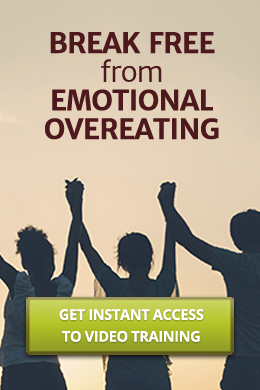Raise your hand if you’re tired of hearing that all you need to do to overcome binge eating is to really put your mind to it. Me, too! That’s why I put together this list of 10 practical tips to help you finally kick the habit– no fluff, I promise.
10 Practical Tips to Overcome Binge Eating
As a former binge eater, I had tried it all. I knew how I wanted to approach food, but every time I would try to get a handle on my overeating I would end up back in the diet/binge cycle. Over the years, I started making some changes to my food and thought process that significantly changed my reaching for food when I would feel stressed or anxious. I would like to share my top 10 tools that helped turn my life around and set me up for success!
1. Set yourself up for success.
Learn how to approach food in a healthy manner– not on a diet, not feeling like your holding your breath to get to the next meal, and not in a way that will set you up for obsessively thinking about the next opportunity to eat.
We’ve heard it before, but are you doing it? Eat frequently throughout the day. It starts with the basics: eating good combinations of fruits and vegetables, healthy proteins and carbs every 3 hours. If you go too long without eating, you will set yourself up to overeat and feel out of control.
2. Plan. Plan. Plan.
Keep healthy food available for the full day. If you don’t have good quality food on hand, you will end up turning to whatever junk is nearby. Just as you wouldn’t send your kids to school without a game plan to eat, you need to have your game plan. You wouldn’t show up to a meeting without your report or presentation materials– you have to be well fed before you go in, and if it’s going to be a while, bring something with you so you can last the duration. We are much better off when we have good fuel in our system.
3. Pay attention to what you’re saying to yourself.
How we communicate with ourselves will affect how we feel, how we handle life challenges, and what ends up showing up in our lives. We can be our own best friend or our own worst enemy. If your internal communications aren’t serving you, then you need to learn how to shift them to helpful, resourceful communications.
4. Meet your personal needs.
A lot of times we don’t even know what our needs are. We are so busy taking care of everyone and everything else that we end up last in our own lives. We then end up rebelling and turning to the food to meet our personal needs. So learn to identify what is going on in your emotional life and how you can support yourself as you handle it. If you don’t know how to handle the situation, that’s when you need the support even more. So learn to truly be your own best friend.
5. Create a truly balanced life.
Many times we let needs at home or at work overshadow the other important parts of our life that tend to get crowded out. We stop focusing on ourselves or prioritizing time for ourselves in the forms of exercise, eating well, time with friends, socialization, or self-care. We then start to feel bad about ourselves. We need to take charge and re-prioritize our time and energy. Pull out your calendar and schedule fun and exercise, just like you would anything else that makes it onto your to-do list or calendar.
6. Cultivate your problem solving skills.
Learning how to overcome challenging situations and people is a key to managing a healthy life. If we don’t have healthy boundaries, it is very easy to get overrun by other’s needs. If you are not sure how to solve an issue, start utilizing your resources, which can help. Think outside the box, research it, or talk to friends or knowledgeable people in the area you need help in, and then pick a direction. The key is, don’t stay stuck. Try an idea to see if it works. If it works, great! If it doesn’t, move on to the next idea. If we do nothing for too long, we end up feeling bad about ourselves, and lack of control many times causes us to turn to food.
7. Develop a strong sense of self confidence and self-esteem.
We want to feel good about ourselves unconditionally. Even if things aren’t the way we would like them to be, we can still feel good about who we are today and the direction we are moving in. Feeling good about ourselves– and feeling whole and complete– allows us to make the best decision we can in the moment.
8. Identify and eliminate self-sabotaging behavior.
If we beat ourselves up emotionally when we get hit with life challenges, we allow those situations to control us. When we are not sure how to fix things or make them right, we end up spiraling down and feeling even worse. If there are patterns in your life that are showing up over and over again but aren’t serving you, it’s time to shift your thought process and let go of those thoughts. Shift them to a healthier approach.
9. Create healthy boundaries with family/friends/work.
Learning to say “No” is a tough one for many of us people-pleasers. We like to make everything right or perfect for everyone, and then we end up sacrificing ourselves. When this happens, we often turn to the food. Determining your own limits of what you can manage comfortably is important, but feeling comfortable sharing it with others is even more important. So you can stand up to yourself, even when others push back or try and put their agendas or needs onto you.
Learn to prioritize yourself. Others may be sad or strike out when you first start setting boundaries, but, in the long run, you will be healthier and you will develop healthier relationships. If people can’t respect your needs, then maybe you need to revisit how much time and energy you put into those relationships.
10. Learn to be your own best friend.
Learning to be our own cheerleader and support system will set you up to feel better when you get hit with the daily ups and downs. Visualize a big bright white light surrounding and supporting you.
These steps are really important tools that will have significant change in your life and approach to food. If you would like more ideas or assistance feel free to touch base and ask for help.
We are a community that works together and helps others break free of emotional overeating, binging, yo-yo dieting and just constantly making poor food choices. We are a safe, discreet environment, where you will get positive results. The Hungry Heart is an 8 session systematic process that helps clients overcome their issues with food. If you are ready to end your battle with food and feel good about yourself, then click here, and let’s get started!








